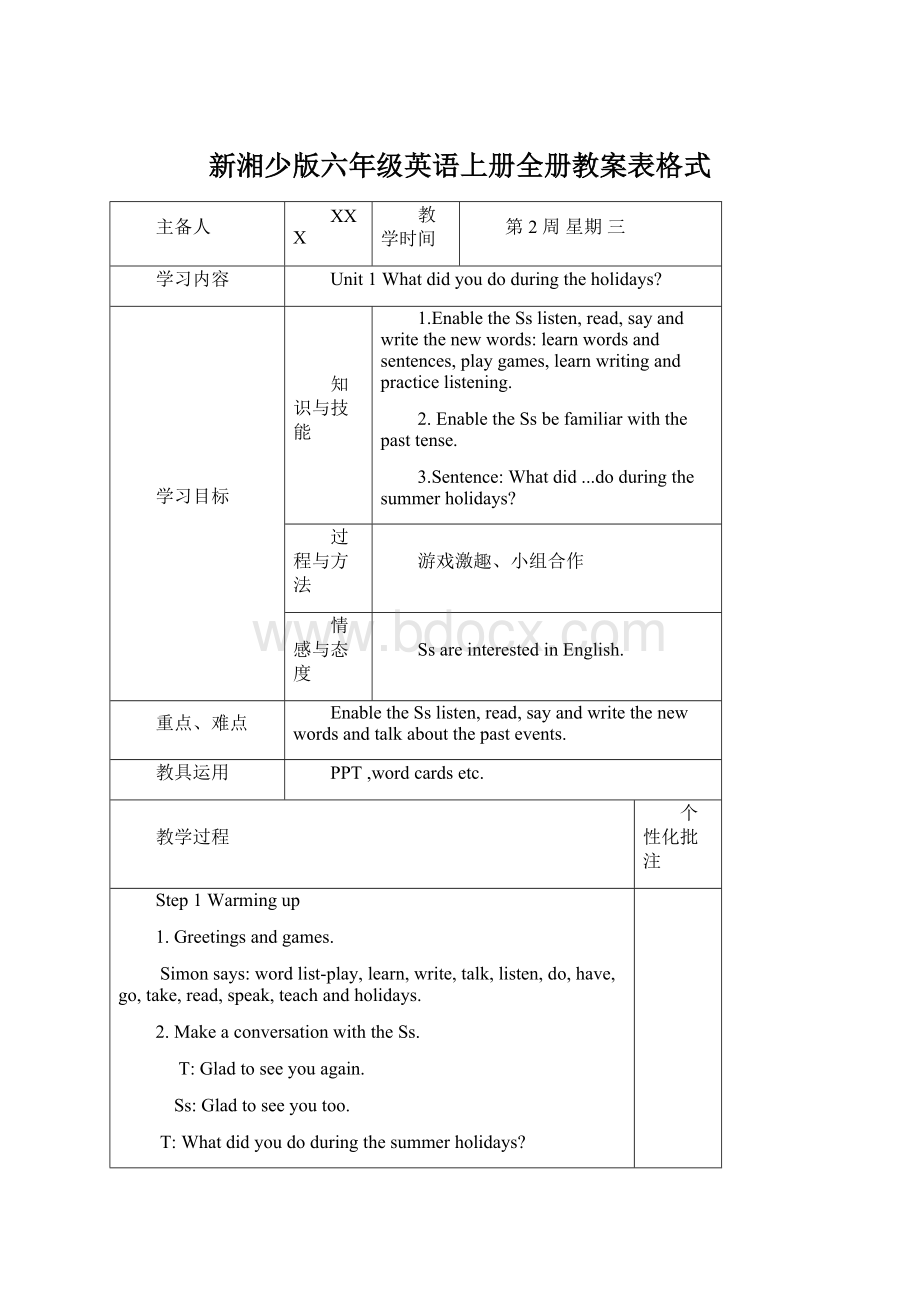新湘少版六年级英语上册全册教案表格式Word文件下载.docx
《新湘少版六年级英语上册全册教案表格式Word文件下载.docx》由会员分享,可在线阅读,更多相关《新湘少版六年级英语上册全册教案表格式Word文件下载.docx(42页珍藏版)》请在冰豆网上搜索。

wordlist-play,learn,write,talk,listen,do,have,go,take,read,speak,teachandholidays.
2.MakeaconversationwiththeSs.
T:
Gladtoseeyouagain.
Ss:
Gladtoseeyoutoo.
T:
Whatdidyoudoduringthesummerholidays?
Ss:
IwenttoHainan…
Step2Presentationanddrill
1.Showthepictureof“learnwordsandsentences”.
ThisisapictureofMingmingduringthesummerholidays.Whatdidhedo?
Heislearningwordsandsentences.
Heisnotdoingitnow.Helearntwordsandsentencesduringthesummerholidays.
2.Learntheotherwordsinthesameway.
3.Readtogether.
4.Littleteacher.
Step3Practice
T:
Helearntwordsandsentences.Theyplayedgames.Shelearntwriting.Hepractisedlistening.(Action)learnwordsandsentences,playgames,learnwritingandpracticelistening…
1.TheSsactandsay.
2.ListentothetapeofPartAandthenanswerthesequestions.WhatdidAnnedoduringthesummerholidays?
WhatdidMingmingdoduringthesummerholidays?
3.Listenandrepeat.
3.Actitout.
Step4Consolidation
1.Evaluation.
2.DoEx.3.
作业设计
Copythenewwords.
板书设计
learn,write,talk,listen,do,have,go,take,read
教
学
后
记
第2周星期四
1.EnabletheSslisten,readandsaythedialogue;
2.EnabletheSsmasterthesentencepattern:
Whatdidyoudoduringtheholidays?
3.EnabletheSsmasterreadtheshortpassagesandjudgeTrueorFalse.
游戏法、激趣法、小组合作学习
EnabletheSslisten,readandsaythedialogue
Step1Warmingup
1.Greetings.
2.Actandsay.
1).(Action)learnwordsandsentences,playgames,learnwritingandpracticelistening…
2).Tom:
Iplayedgames.
Ss:
Tomplayedgames.…
Step2Presentationanddrill
1.ListentothetapeandlearntheWordBank.Whatdidyoudoduringtheholidays?
Ireadmanybooks.Ivisitedmygrandparents.Iplayedgameswithmyfriends.
Step3Practice
1.Listentothetapeandrepeat.
2.Pair-work.
3.Group-work.
Step4Let’sRead
1.ReadtheshortpassageandthenjudgeTrueorFlase.
2.Readthepassageagainandunderlinethekeysentences.
3.Checktheanswers.
Step5Consolidation
1.Evaluation.
2.DoEx
3.Homework.
Recitethetext.
Ss:
第3周星期三
1.EnabletheSstalkabouttheirholidays.
2.EnabletheSsandwritedowntheirholidays.
Oralmethod
Teachingemphasis:
EnabletheSsdescribetheirholidays.Teachingdifficulties:
EnabletheSstotalkaboutandwritedowntheirholidays
2.ReadPartAtogether.
1.AskstudentstotalkabouttheirsummerholidaysandthenletthemfinishPartE:
writedownyouranswers
2.Checktheanswer.
3.AsktwoSstotalkabouttheiranswers.
Step3Let’sHaveFun
1.Classwork.Lookatthepictures,describeMingming’sandAnne’sholidays.
2.Classwork.describeyourholidays.
Step4Consolidation
1.DoEx.WorkbookUnit1.
2.Evaluation
3.Homework.ReviseUnit1.
ReviseUnit1.
第3周星期四
2、Katiealwaysgetsupearly.
Learnthesenewwords:
wakeup;
makethebed;
wave;
late,always;
usually;
often;
never.
TPR;
Task-basedmethod;
Discussing
Toformthehealthlivinghabit
Thestudentsmasterthewords:
late;
always;
a.Greetings.
b.singasong:
London Bridge isfallingdown
c.Freetalk.Talkingaboutmyday.
Step2Review
a.Game—Guess,guess,guess
Usethecardstogooverthewords
b.Retellthestory—Unit1
Step3Presentation
a.Learnthewordsandexpressions:
late
Atfirstshowthelearnedword:
cake.Letthestudentsreadtheword,thenwritethewordscarefully.
cake
wakewakeup
makemakethebed.
wave
late
Fromabovetofindouttherulesofpronunciationandmemorywords.
Wakeup.
e.g.a.Whattimedoyouusuallywakeup?
b.Iusuallywakeupat6.
makethebed
e.g.a.Doshemakethebedinthemorning?
b.Thefirstthinghedoesaftergettingupistomakethebed.
waveagreeting挥手致意
wavegood-byetosb.挥手告别
late.
e.g.I’mlate
lateautumn暮秋,深秋
getuplate睡懒觉
b.LetthestudentsunderstandfrequencyAdverbs(频率副词):
alwaysoftenusuallyneveralways
Readthesewordsseveraltimesandtrytorememberthem.Atthesametime,explainthemeaningsofdifferentadverbsoffrequency.
100%
always
Ialwaysstayathomeintheevenings.
90%
usually
Iusuallywakeupearly.
80%
often
Heoftengoestoschoolonfoot.
0%never
Henevergoestoschoollate.
Step4.Practice
Practicethewords.
a.Game1.Loudandlowvoice.
b.Game2.Quickresponse
Theteacherbringsoutsomepicturesandwordcards,thestudentsspeakoutthewordsquickly.
c.Game3.Guessinggame
Recitethenewwords.
2、Katiealwaysgetsupearly.
第4周星期三
2、Katiealwaysgetsupearly.
a.LearnPartALet’slistenandsay.Katie’sDay.
b.Grasptheusageofadverbsoffrequency.
a.Withthestudyingstrategies,getthestudentstoworkinpairsorgroupstotalkabouttheirday.
b.Letthestudentspracticespeakingandwriting.
a.Sscanusethepresenttenseofthethirdperson:
get-getsmake-makeswash-washesrun-runsleave-leaveshave-has
b.Sscanmastersentencestructure:
sbdosthatsometime
b.singasong
Step2
Review
Game—Goldenfinger
Usethecardstogooverthewords
Step3Presentationanddrill
a.Listeningtotherecorder
b.T:
You’reverygood.Youareallgoodpupils.AndKatieisagoodpupiltoo.Everyonelikesher.Sheisneverlateforschool.Shealwaysgetsupearlyeveryday.Thenshemakesbed.afterbreakfast,shewavesherfamilygoodbye.
c.Fastreadingthetext.
d.Answerthefollowingquestions.
DoesKatiealwaysgetsupearly?
WhattimedoesKatiewashherface?
WhattimedoesKatiemakeherbed?
IsSallyisoftenlate?
WhattimedoesKatie’sfatherleaveforwork?
e.Explainthegrammarforthepupils:
Thepresenttenseofthethirdperson.
e.g.
1.Ialwaysgetupearly.
Katie
always
getsupearly.
2.Weusuallyhavebreakfastat6:
30am.
Heusuallyhasbreakfastat6:
30am.
3.Youoftenwashyourfaceat6:
05am.
Sheoftenwashesyourfaceat6:
4.Theyalwaysleaveforworkat70’clock.
Katie’sfatheralwaysleavesforworkat70’clock
Step4Practice
a.Readingthetextcarefully.
b.Listenandrepeatit
c.Retellit,checktheresult
d.Practiceinpairs,accordingtotheformtosaysomethingabouttheirday.
Step5Consolidation
a.PartCAboutthestory.Putatick(√)ifthesentencescorrectofacross(×
)iftheyarewrong.
1.
Katiealwaysgetsupatsixo’clock.(√)
2.
Katiealwayswashesherfaceat6:
15am.(×
)
3.
Katie’sfamilyoftenhasbreakfastat6:
45am.(×
4.
Sallyalwaysgoestothebreakfasttableontime.(×
5.
Katie’sfatherusuallywavesthengoodbye.(√)
b.Homework:
Listenandreadthedialogue,copythenewwords
Listenandreadthedialogue,
copythenewwords
2、2、Katiealwaysgetsupearly.
get–gets
make-makes
wash–washes
run-runs
leave-leaves
have-has
第4周星期四
a.Goingoverwords.
b.Retellthestory.
c.FinishPartD,E,F.
Thestudentscandescribetheother’sactions
b.Singasong.
c.Freetalk:
Saysomethingaboutyourdailylife
Step2.Review
a.Playagame–magiceyes
Goingoverthelearnedwords:
slide,bench,bark,chain,
swing,stone,bite,wakeup,makethebed,have,late.always,usually,often,never.
b.Usethecardstogooverthenewdialogue,andmakesentenceswiththepresenttense,theyarerequirednottomakethesamesentences
c.Retellthestory
Step3Dril